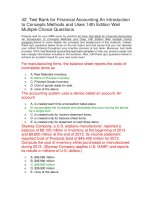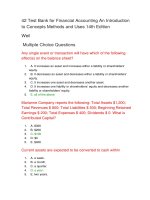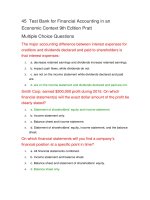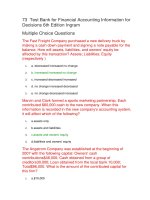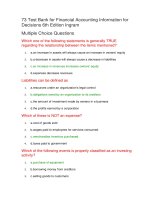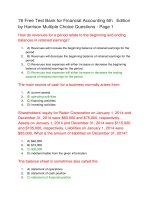118 test bank for financial accounting
Bạn đang xem bản rút gọn của tài liệu. Xem và tải ngay bản đầy đủ của tài liệu tại đây (121.79 KB, 26 trang )
118 Test Bank for Financial Accounting
True-False Questions
Revenues are increases in retained earnings from the delivery
of goods or services.
1.
True
2.
False
A form of the accounting equation can be stated as Assets Liabilities = Share capital + Retained earnings.
1.
True
2.
False
Dividends are a form of expenses.
1.
True
2.
False
The basic component of share capital is retained earnings.
1.
True
2.
False
From an accounting viewpoint, a proprietorship is a distinct and
separate entity from the proprietor.
1.
True
2.
False
Revenues less cash outflow equals net income (or net loss..
1.
True
2.
False
Accounting is called an information system since it measures
business activities, processes data into reports, and
communicates results to decision makers.
1.
True
2.
False
Expenses are increases in retained earnings that result from
operations.
1.
True
2.
False
The three forms of business organizations are sole
proprietorships, partnerships, and non-profit
organizations.
1.
True
2.
False
The Cash Flow Statement is organized in terms of the
organization's operating, investing, and financing
activities.
1.
True
2.
False
Retained earnings represent cash that is available to a company
for future operations and expansion.
1.
True
2.
False
All corporations have to follow the same sections of the CICA
Handbook.
1.
True
2.
False
Generally accepted accounting principles, or GAAP, are the
rules and procedures established by the Canadian
Institute of Chartered Accountants, or CICA.
1.
True
2.
False
Liabilities are often referred to as "outsider claims" and owners'
equity as "insider claims" to assets.
1.
True
2.
False
The owners' equity of proprietorships and partnerships is
different.
1.
True
2.
False
Since they are both the same activities, the terms "accounting"
and "bookkeeping" are synonymous and can be used
interchangeably.
1.
True
2.
False
From a legal perspective, sole proprietors, partners and
shareholders are personally liable for the debts of their
businesses they invest in.
1.
True
2.
False
For business purposes, dividend payments are classified as
expenses.
1.
True
2.
False
The accounting equation must always be in balance.
1.
True
2.
False
Shareholders' equity is often referred to as "net assets" and
represents the residual amount of business assets that
can be claimed by the owners.
1.
True
2.
False
The reliability principle states that assets and services should
be recorded at their actual cost, since cost is a reliable
measure to use in financial accounting.
1.
True
2.
False
It would be unusual for the balance sheet of a proprietorship to
include the term "retained earnings."
1.
True
2.
False
Net earnings are calculated by taking a company's earnings
less their dividends paid out.
1.
True
2.
False
In accounting, the word "net" means after a subtraction.
1.
True
2.
False
Multiple Choice Questions-Page 1
The date of the income statement:
1.
A. covers one day in time
2.
B. covers a period of time, usually for an accounting period
3.
C. is not dated
4.
D. may cover a period of time or only one day in time, like a snapshot photograph
An investor wishes to assess a company's financial position at
the end of the period. Which financial statement would the
investor probably examine?
1.
A. the cash flow statement
2.
B. the income statement
3.
C. the balance sheet
4.
D. the statement of retained earnings
If assets increase $120,000 during a given period and liabilities
decrease $25,000 during the same period, shareholders'
equity must:
1.
A. increase $95,000
2.
B. decrease $145,000
3.
C. decrease $95,000
4.
D. increase $145,000
The ending balance in retained earnings appears on the:
1.
A. balance sheet only
2.
B. balance sheet and statement of retained earnings
3.
C. statement of retained earnings only
4.
D. income statement
Which of the following financial statements would a potential
investor most likely use to evaluate a company's financial
performance for the current period?
1.
A. balance sheet
2.
B. income statement
3.
C. cash flow statement
4.
D. retained earnings statement
Losses are reported on the:
1.
A. income statement
2.
B. balance sheet
3.
C. cash flow statement
4.
D. statement of retained earnings
Dividends appear on the:
1.
A. retained earnings statement
2.
B. income statement
3.
C. balance sheet
4.
D. both the retained earnings statement and the income statement
The accounting equation can be stated as:
1.
A. Assets + Liabilities = Shareholders' equity
2.
B. Assets = Liabilities + Shareholders' equity
3.
C. Assets = Liabilities - Shareholders' equity
4.
D. Assets + Shareholders' equity = Liabilities
Net income is:
1.
A. deducted from beginning retained earnings on the retained earnings statement
2.
B. added to beginning retained earnings on the retained earnings statement
3.
C. added to assets on the balance sheet
4.
D. deducted from net sales on the income statement
Revenues are:
1.
A. increases in liabilities resulting from delivering goods or services to customers
2.
B. increases in retained earnings resulting from delivering goods or services to
customers
3.
C. decreases in assets resulting from delivering goods or services to customers
4.
D. decreases in retained earnings resulting from delivering goods or services to
customers
Cost of goods sold is:
1.
A. added to sales on the income statement
2.
B. deducted from sales on the balance sheet
3.
C. deducted from sales on the income statement
4.
D. added to sales on the retained earnings statement
To determine a company's gross margin for the period, an
investor would look on the:
1.
A. balance sheet
2.
B. cash flow statement
3.
C. income statement
4.
D. statement of retained earnings
Financial statements are:
1.
A. reports issued by outside consultants who are hired to analyze key operations of the
business
2.
B. reports created by management that states it is responsible for the acts of the
corporation
3.
C. standard documents that tell us how well a business is performing and where it
stands in financial terms
4.
D. standard documents issued by outside consultants who are hired to analyze key
operations of the business in financial terms
Common shares is a component of:
1.
A. total assets
2.
B. total liabilities
3.
C. share capital
4.
D. retained earnings
Common shares appear on the:
1.
A. balance sheet
2.
B. income statement
3.
C. cash flow statement
4.
D. retained earnings statement
Suppose The Fruit Group buys a kiwi for $.10 and sells the kiwi
for $.50. The cost of goods sold would be:
1.
A. $.10
2.
B. $.40
3.
C. $.50
4.
D. $.05.
Which of the following persons or groups have the ultimate
control of a corporation?
1.
A. the chief executive officer
2.
B. the board of directors
3.
C. the audit committee
4.
D. the shareholders
All of the following are forms of business organizations except:
1.
A. proprietorship
2.
B. partnership
3.
C. restaurant
4.
D. corporation
Expenses are:
1.
A. increases in assets resulting from operations
2.
B. increases in retained earnings resulting from operations
3.
C. increases in liabilities resulting from purchasing assets
4.
D. decreases in retained earnings resulting from operations
Assets appear on the:
1.
A. balance sheet
2.
B. income statement
3.
C. retained earnings statement
4.
D. cash flow statement
If liabilities increase $120,000 during a given period and
shareholders' equity decreases $25,000 during the same
period, assets must:
1.
A. decrease $145,000
2.
B. increase $145,000
3.
C. increase $95,000
4.
D. decrease $95,000
Gains and losses appear on which of the financial statements
listed below?
1.
A. the balance sheet
2.
B. the income statement
3.
C. the retained earnings statement
4.
D. the cash flow statement
Payables are classified as:
1.
A. increases in earnings
2.
B. assets
3.
C. decreases in earnings
4.
D. liabilities
Cash received from the sale of shares would appear:
1.
A. as an operating activity on the cash flow statement
2.
B. would not appear on a cash flow statement
3.
C. as an investing activity on the cash flow statement
4.
D. as a financing activity on the cash flow statement
Notes receivable due in 60 days would be classified as a:
1.
A. long-term asset on the balance sheet
2.
B. current asset on the balance sheet
3.
C. current liability on the balance sheet
4.
D. long-term liability on the balance sheet
How do revenues for a period relate to the beginning and
ending balances in retained earnings?
1.
A. Revenues will increase the beginning balance of retained earnings for the period.
2.
B. Revenues will decrease the beginning balance of retained earnings for the period.
3.
C. Revenues less expenses will either increase or decrease the beginning balance of
retained earnings for the period.
4.
D. Revenues less expenses will either increase or decrease the ending balance of
retained earnings for the period.
Claims held by the shareholders (owners. of a corporation are
referred to as:
1.
A. retained earnings
2.
B. share capital
3.
C. share capital minus retained earnings
4.
D. share capital plus retained earnings
The owners' interest in the assets of a corporation is known as:
1.
A. assets
2.
B. shareholders' equity
3.
C. expenses
4.
D. revenues
Which of the following represent(s. claims to economic
resources?
1.
A. assets, but not liabilities or owners' equity
2.
B. owners' equity, but not assets or liabilities
3.
C. liabilities, but not assets or owners' equity
4.
D. liabilities and owners' equity, but not assets
Cash dividends:
1.
A. decrease revenue on the income statement
2.
B. increase expenses on the income statement
3.
C. decrease retained earnings on the retained earnings statement
4.
D. decrease operating activities on the cash flow statement
The cash flow statement is divided into three categories relating
to cash flows from operating, investing, and:
1.
A. management planning activities
2.
B. financing activities
3.
C. strategic positioning activities
4.
D. marketing activities
The balance sheet is sometimes also called the:
1.
A. statement of operations
2.
B. statement of cash position
3.
C. statement of financial position
4.
D. statement of income and expense
Dividends:
1.
A. always affect net income
2.
B. are distributions to shareholders of assets (usually cash. generated by net income
3.
C. are expenses
4.
D. are distributions to shareholders of assets (usually cash. generated by a favourable
balance in retained earnings
Receivables are classified as:
1.
A. increases in earnings
2.
B. assets
3.
C. decreases in earnings
4.
D. liabilities
Which of the following represent(s. claims to economic
resources?
1.
A. assets, but not liabilities or owners' equity
2.
B. owners' equity, but not assets or liabilities
3.
C. liabilities, but not assets or owners' equity
4.
D. liabilities and owners' equity, but not assets
Operating expenses appear on the income statement:
1.
A. directly after gross margin
2.
B. directly after cost of goods sold
3.
C. directly after revenue
4.
D. do not appear on the income statement
What is the proper order for the cash flow statement?
1.
A. financing activities, investing activities, and operating activities
2.
B. operating activities, investing activities, and financing activities
3.
C. operating activities, financing activities, and investing activities
4.
D. investing activities, financing activities, and operating activities
Shareholders' equity for Raisin Corporation on January 1, 2010
and December 31, 2010 were $60,000 and $75,000,
respectively. Assets on January 1, 2010 and December 31,
2010 were $115,000 and $105,000, respectively. Liabilities
on January 1, 2010 were $55,000. What is the amount of
liabilities on December 31, 2010?
1.
A. $40,000
2.
B. $15,000
3.
C. $30,000
4.
D. indeterminable from the given information
On January 1, 2010, total assets for Liftoff Technologies were
$125,000; on December 31, 2010, total assets were
$145,000. On January 1, 2010, total liabilities were
$110,000; on December 31, 2010, total liabilities were
$115,000. What are the amount of the change and the
direction of the change in Liftoff Technologies
shareholders' equity for 2010?
1.
A. decrease of $15,000
2.
B. increase of $15,000
3.
C. increase of $30,000
4.
D. decrease of $30,000
Which of the following best describes a liability?
1.
A. Liabilities are a form of share capital.
2.
B. Liabilities are future economic benefits to which a company is entitled.
3.
C. Liabilities are accounts receivable of the company.
4.
D. Liabilities are economic obligations to creditors to be paid at some future date by the
company.
81 Free Test Bank for Financial Accounting 4th
Canadian Edition by Harrison Multiple Choice
Questions-Page 2
Purchases and sales of long-term assets are examples of:
1.
A. investing activities
2.
B. dividend activities
3.
C. financing activities
4.
D. operating activities
The oldest organization of professional accountants in Canada
is the:
1.
A. Canadian Institute of Chartered Accountants
2.
B. Securities and Exchange Commission
3.
C. Financial Accounting Standards Board
4.
D. Auditing Standards Board
In order for information to be considered a faithful
representation it must be all of the following except:
1.
A. complete
2.
B. predictive
3.
C. without material error
4.
D. neutral
Assets are generally divided into:
1.
A. current assets and solvent assets
2.
B. current assets and reliable assets
3.
C. long-term assets and solvent assets
4.
D. current assets and long-term assets
Which financial statement must be prepared before the others?
1.
A. income statement
2.
B. balance sheet
3.
C. cash flow statement
4.
D. retained earnings statement
The balance sheet contains:
1.
A. the amount of net income
2.
B. the beginning balance in retained earnings
3.
C. the ending balance in retained earnings
4.
D. the amount of dividends paid to shareholders
When accounting for cash collected from customers, the
transaction would appear on the cash flow statement as
a(an.:
1.
A. operating activity
2.
B. financing activity
3.
C. investing activity
4.
D. activity that would not appear on the cash flow statement.
The statement that presents a summary of the revenues and
expenses of an entity is called the:
1.
A. balance sheet
2.
B. cash flow statement
3.
C. statement of retained earnings
4.
D. income statement
The ________ assumption assumes that the organization will
remain in operation long enough to use existing assets.
1.
A. cost
2.
B. stable monetary unit
3.
C. entity
4.
D. going-concern
The balance sheet contains information about:
1.
A. liabilities, equity, and expenses
2.
B. assets, revenues, and liabilities
3.
C. assets, liabilities, and equity
4.
D. revenues, expenses, and equity
Which of the following financial statements shows the net
increase or decrease in cash during the period?
1.
A. balance sheet
2.
B. income statement
3.
C. statement of retained earnings
4.
D. cash flow statement
Accounts payable would appear on the:
1.
A. income statement with the expenses
2.
B. retained earnings statement with the dividends
3.
C. balance sheet with the current assets
4.
D. balance sheet with the current liabilities
The accounting concept that maintains that each organization
or section of an organization stands apart from other
organizations and individuals is known as the:
1.
A. reliability principle
2.
B. going-concern assumption
3.
C. entity assumption
4.
D. monetary unit assumption
The stable-monetary-unit assumption is the basis for ignoring:
1.
A. the possibility that the value of inventory might drop below its historical cost
2.
B. fluctuations in the value of the Canadian dollar relative to foreign currencies
3.
C. the effect of inflation in the accounting records
4.
D. the difference between the appraised value and the actual cost when recording an
asset at its historical cost
When a repurchase of shares is done by a company it:
1.
A. increases the amount of owners' equity
2.
B. decreases the amount of owners' equity
3.
C. decreases the amount of total liabilities
4.
D. increases the amount of total liabilities
The principle that states that assets acquired by the business
should be recorded at their actual price is the:
1.
A. objectivity assumption
2.
B. stable monetary unit assumption
3.
C. cost assumption
4.
D. reliability assumption
Which of the following statements should be prepared before
the balance sheet is prepared?
1.
A. statement of retained earnings
2.
B. cash flow statement
3.
C. statement of financial position
4.
D. both the statement of retained earnings and the cash flow statement
Decreases in shareholders' equity result from:
1.
A. owner investments
2.
B. a net loss during the period
3.
C. a net income during the period
4.
D. owner investments and a net loss during the period
Retained earnings appears on which of the following financial
statements?
1.
A. statement of retained earnings, cash flow statement, and income statement, but not
the balance sheet
2.
B. statement of retained earnings and balance sheet, but not the income statement or
cash flow statement
3.
C. statement of retained earnings, cash flow statement, and balance sheet, but not the
income statement
4.
D. statement of retained earnings and cash flow statement, but not the income
statement or balance sheet
Cash would appear on the:
1.
A. income statement with the revenues
2.
B. retained earnings statement with the net income
3.
C. balance sheet with the current assets
4.
D. balance sheet with the current liabilities
The CEO of a business owns a home and two automobiles. The
company the CEO works for also owns automobiles and a
home in a remote area used for strategic planning
meetings by its executives. Which principle or
assumption "draws a sharp boundary" around the
possessions of the CEO and the assets of the business
for which he works?
1.
A. the entity assmption
2.
B. the stable-monetary-unit assumption
3.
C. the going-concern assumption
4.
D. the objectivity assumption
Equipment would appear on the:
1.
A. income statement with the revenues
2.
B. balance sheet with the long-term assets
3.
C. balance sheet with the current assets
4.
D. income statement with the operating expenses
Which of the following statements below is true?
1.
A. The value of a dollar changes over time.
2.
B. British accountants are required to record transactions in dollars.
3.
C. The stable-monetary-unit assumption requires adjustments to the accounting
records for the effects of inflation.
4.
D. High inflation rates indicate a dollar's purchasing power is stable when compared
with other currencies.
Which financial statement is based on the accounting
equation?
1.
A. statement of retained earnings
2.
B. income statement
3.
C. cash flow statement
4.
D. balance sheet
Depreciation is normally associated with which asset on the
balance sheet?
1.
A. Land
2.
B. accounts receivable
3.
C. inventory
4.
D. equipment
Current assets are assets expected to be converted to cash,
sold, or consumed:
1.
A. within the next 12 months or within the business's normal operating cycle if less than
a year
2.
B. within the next 12 months or within the business's normal operating cycle if longer
than a year
3.
C. within the next 6 months
4.
D. within the next 24 months
What is one component of shareholders' equity?
1.
A. common shares
2.
B. notes payable
3.
C. property, plant, and equipment
4.
D. cash
Increases in shareholders' equity arise from:
1.
A. investments by the owner
2.
B. payment of dividends
3.
C. net income earned during the period
4.
D. both investments by the owner and net income earned during the period
The income statement presents a summary of the:
1.
A. revenues and expenses of an entity for a specific time period
2.
B. assets and liabilities of an entity
3.
C. cash inflows and outflows of an entity
4.
D. changes that occurred in the shareholders' equity of an entity
The payment of salaries would appear:
1.
A. on the cash flow statement with the operating activities
2.
B. on the balance sheet with the current liabilities
3.
C. on the income statement with the revenues
4.
D. on the income statement as part of cost of goods sold
According to the Canadian Institute of Chartered Accountants
(CICA., the primary objective of financial reporting is to
provide information:
1.
A. to the federal government about tax matters
2.
B. useful for making investment and lending decisions
3.
C. regarding the cash flows of the business
4.
D. about the profitability of the business
Income taxes owed to the federal government would be
classified as a:
1.
A. current asset on the balance sheet
2.
B. current liability on the balance sheet
3.
C. long-term asset on the balance sheet
4.
D. financing activity on the cash flow statement
Accounting standards for accountants in Canada are
established by:
1.
A. the Canadian Institute of Chartered Accountants
2.
B. the Society of Management Accountants of Canada
3.
C. the Certified General Accountants Association of Canada
4.
D. the Canadian Institute of Chartered Accountants, the Society of Management
Accountants of Canada, and the Certified General Accountants Association of Canada
The repayment of a note payable would be classified as a(n.:
1.
A. investing activity on a cash flow statement
2.
B. financing activity on a cash flow statement
3.
C. operating activity on a cash flow statement
4.
D. current asset on the balance sheet
All of the following are considered standard financial
statements except the:
1.
A. statement of earnings
2.
B. statement of assets
3.
C. statement of retained earnings
4.
D. cash flow statement
The issuance of shares for cash would be classified as a(n.:
1.
A. investing activity on a cash flow statement
2.
B. financing activity on a cash flow statement
3.
C. operating activity on a cash flow statement
4.
D. current asset on the balance sheet
The amount of net income shown on the income statement also
appears on the:
1.
A. balance sheet
2.
B. statement of assets
3.
C. statement of financial position
4.
D. statement of retained earnings
The relevant measure of value of the assets of a company that
is going out of business is its:
1.
A. historical cost
2.
B. recorded value
3.
C. book value
4.
D. Liquidation value
Cash spent to purchase a new building would appear on the
cash flow statement as:
1.
A. a financing activity
2.
B. an operating activity
3.
C. an investing activity
4.
D. purchases of new equipment do not appear on a cash flow statement
Which of the following financial statements provides a
"snapshot photo" of one moment in time?
1.
A. balance sheet
2.
B. income statement
3.
C. statement of retained earnings
4.
D. cash flow statement
The main source of cash for a business stems from:
1.
A. current assets
2.
B. operating activities
3.
C. financing activities
4.
D. investing activities
Free Text Questions
Gildan Activewear is a publicly owned corporation. How does it
differ from a privately owned corporation?
Answer Given
The shares of Gilden can be bought or sold on the Toronto Stock Exchange without
asking the permission of the other shareholders, which is not true of a private
corporation. The ownership of the shares of private corporations is limited. Shares of
private corporations can only be purchased with the agreement of the existing
shareholders. Private corporations are not necessarily small. For instance, The Jim
Pattison Group is Canada's third largest privately held company and has 27,000
employees and annual sales of almost $6 billion.
What is a Nonprofit organization?
Answer Given
A Nonprofit organization is organized for some other purpose than the earning of profit.
Many examples are possible. For example, The Salvation Army or the University of
Toronto are organized for the purpose of providing services to community
stakeholders. Many business students will eventually find employment in Nonprofit
organizations or the public sector and a knowledge of accounting is just as important
in these types of organizations as it is in multinational public corporations.
What do creditors such as bankers look for when reviewing
assets and liabilities on the balance sheet?
Answer Given
Assets show what the company can pledge as collateral that a creditor can collect in
the event of the company failing to pay its debts. Liabilities indicate how much the
company owes other creditors. Assets should be increasing faster than liabilities over
time. The amount of assets should exceed the amount of liabilities.
There are many different stakeholders in Gildan Activewear Inc.
Explain why the same information may not be suitable or
appropriate for all stakeholders.
Answer Given
Different stakeholders make different decisions that require different information. For
example, lenders want to know whether the company will be able to repay its loans but
the Canada Revenue Agency (CRA. wants to know the amount of taxes that should be
paid for the current year. Much of the information that the lenders would request, such
as who are the company's major customers and the amounts they owe the company,
would be of no interest to CRA. CRA is simply interested in compliance with the
income tax act.
Your friend has asked you to review and analyze the financial
status of her company before she goes to the bank to
request a loan. Answer the following questions: a. What
will you need to review in order to make a sound
decision? b. What will the bank be looking for? Be
specific.
Answer Given
a. A decision maker would like to have access to all the financial statements of a
company for several years, including the income statement, balance sheet, statement
of retained earnings, and cash flow statement. b. The bank will be looking at the
company's ability to repay the loan. The bank will look at the amount of income
generated by the company for the past several years as well as whether or not it has
been increasing or decreasing. The amount of debt already owed by the company will
also be an issue. The bank would like to see that shareholders' equity exceeds total
liabilities at the time of the loan request. Also, dividends paid to the owner should not
exceed the net income in any given period. These are indications that the owner is as
much at risk as the bank would be if the loan were granted.
A company's management makes three major types of
decisions on an ongoing basis: decisions regarding
operating activities, decisions regarding investing
activities, and decisions regarding financing activities.
Discuss each of these three types of activities, including
examples of each type.
Answer Given
Operating activities relate to deciding how to operate the business and involves
decisions such as what products and/or services to sell, what prices to sell those
products and services for, and how to market those products and services. Investing
activities relate to deciding what kinds of investments to make and involve decisions
such as what types of long-term assets to buy. Financing activities relate to deciding
how to finance the company's operations and involve decisions such as whether to
obtain cash by selling shares or by borrowing from a bank.
Think about the impact accounting has on our economy and our
nation. Name some external groups interested in
reviewing a company's financial statements.
Answer Given
shareholders and other investors; bankers; other creditors; Canada Customs and
Revenue Agency; other governmental agencies; the general public
What is the purpose of a cash flow statement?
Answer Given
A cash flow statement reports how the company generates and uses its cash. Wise
use of cash generates revenues and additional cash. Operating activities should be
the main source of cash. The cash flow statement provides information that would be
difficult to obtain from analyzing the other financial statements.
There are several types of decision makers who use accounting
information. List five of these users of accounting
information and give an example of a decision each would
make.
Answer Given
Individuals: to manage bank accounts, to evaluate job prospects, to make
investments, to decide whether to rent or buy a home; Managers of businesses: to set
goals for the organization, to evaluate progress toward those goals, to decide how
much inventory to keep on hand, to decide how much cash to borrow; Investors and
creditors: to decide whether or not to invest in a new company, to determine whether
or not to make a loan; Government regulatory agencies (e.g., Ontario Securities
Commission: to make sure that the company is abiding by federal or provincial
regulations; Taxing authorities: to determine the amount of tax due; Non-profit
organizations: to set goals for the organization, to evaluate progress toward those
goals, to decide how much cash to borrow; Labour unions: to determine wage
demands
Accounting is often referred to as "the language of business."
Why is accounting described this way? How is
accounting different from bookkeeping?
Answer Given
Accounting is the system that measures business activities, processes that information
into reports, and communicates the results to decision makers. Accounting, as an
information system, provides the elements necessary for management and others to
make decisions and estimate how well a company may perform in the future.
Accounting is the common "language" used by managers, investors, and others to
communicate information about a business. Bookkeeping is simply the procedural
element of accounting that processes the accounting data. Accounting is an
information system, of which bookkeeping is a component.
Describe the relationship between the Income Statement,
Statement of Retained Earnings and the Balance.
Answer Given
The income statement needs to be prepared first as the net income figure is part of the
calculation of ending retained earnings on the Statement of Retained Earnings. Once
the Statement of Retained Earnings has been prepared this figure is then inserted in
the Balance Sheet in the Shareholders' Equity section.
What do shareholders look for when reviewing and analyzing
the income statement?
Answer Given
When reviewing the income statement, shareholders look for steadily increasing levels
of net income over time. Net income on an income statement means the company is
profitable. A steady increase in net income indicates the company's profits are solid.
Net income affects both stock prices and future dividends. A shareholder's personal
wealth will be enhanced through an increase in the market price of the company's
stock and future dividends to be received.

